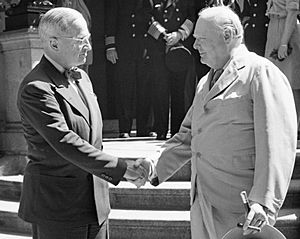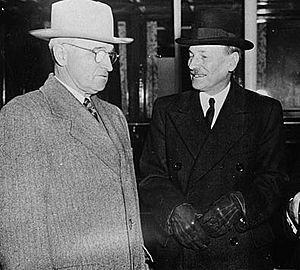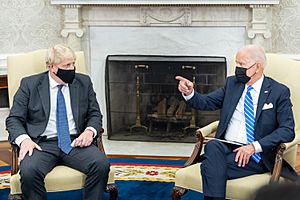Special Relationship facts for kids
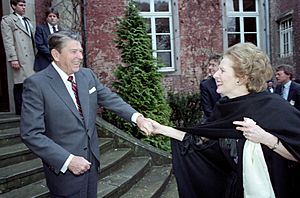
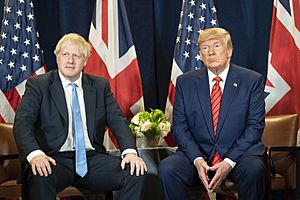
The Special Relationship is a phrase often used to describe the very close ties between the United Kingdom and the United States. These ties include political, diplomatic, cultural, economic, and military connections. The term became popular after former British Prime Minister Winston Churchill used it in a speech in 1946. Both countries have been strong allies in many big conflicts. These include World War I, World War II, the Korean War, the Cold War, the Gulf War, and the war on terror.
Even though both governments are close with many other nations, the cooperation between the UK and the US is often called "unparalleled." This means it's stronger than any other. They work together a lot in trade, military planning, sharing nuclear weapons technology, and sharing intelligence. Leaders like Margaret Thatcher and Ronald Reagan, and Tony Blair with both Bill Clinton and George W. Bush, had very close relationships. Diplomatically, they often say their relationship is "special." They also have frequent visits and share a lot of information.
Some people disagree and say the "special relationship" is just a myth. For example, former US President Barack Obama saw German Chancellor Angela Merkel as his "closest international partner." He also said the UK would be at the "back of the queue" for a trade deal if it left the European Union. During the 1956 Suez Crisis, US President Dwight Eisenhower even threatened to hurt Britain's money system because of its actions in Egypt.
After Donald Trump became US president, the British government, led by Prime Ministers Theresa May and Boris Johnson, tried to build a "new special relationship" with his team. Trump said his relationship with Theresa May was "the highest level of special." He also praised Johnson and liked being compared to him.
Contents
How the Special Relationship Started
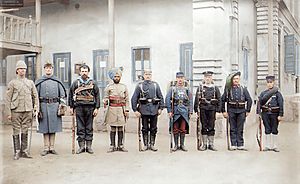
Even though Winston Churchill made the term "Special Relationship" famous, the idea of a close bond between the UK and US existed before. It was even noticed by other countries in the 1800s.
At first, the American and British governments were enemies. This happened after the American colonies declared their independence from British rule, starting the American Revolutionary War. Relations were often difficult until the mid-1800s. They even fought in the War of 1812. There was also tension when Britain almost supported the Confederate States during the American Civil War.
However, many British people felt a common "special relationship" because they shared the same language, many people moved between the countries, and they had similar beliefs and trade. This feeling helped prevent wars. By 1859, soldiers from both nations sometimes fought together overseas. Both countries, as democracies, also shared a bond during the First World War. The US joined the war in 1917 as an "Associated Power."
But, for much of the time between the World Wars (after 1919), relations were often cool. British leaders felt they couldn't rely on the US because of things like the US not joining the League of Nations. US Secretary of State Dean Acheson once said that while a unique relationship existed due to shared language and history, "unique did not mean affectionate."
Churchill's Role in the Special Relationship
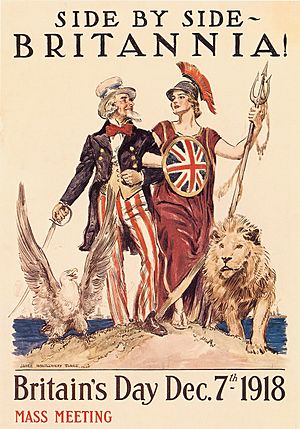
When World War II started, the relationship between the two nations quickly became very positive. The Fall of France in 1940 was a key moment. It made the Special Relationship the most important international bond. During the war, the UK and US worked together militarily in a way that was "unprecedented." Winston Churchill was very close to US President Franklin D. Roosevelt. They exchanged 1,700 letters and telegrams and met 11 times during the war.
Churchill's mother was American, and he felt a strong connection between the two English-speaking peoples. He first used the term "special relationship" in 1944. He believed that if Britain and the US were not joined in a special relationship, another destructive war would happen. He used the phrase again in 1946, at the start of the Cold War. He spoke about the special bond between the US and the English-speaking nations of the British Commonwealth.
He said that a "fraternal association" (brotherly partnership) of English-speaking peoples was needed to prevent war. This partnership would involve growing friendship, shared understanding, and close ties between their military advisors. It would also mean sharing military bases around the world. Churchill believed this special relationship would help the World Organisation become stronger.
Many officials on both sides have supported the Special Relationship. British Prime Minister Margaret Thatcher said in 1982 that the Anglo-American relationship had done more for freedom than any other alliance.
Military Cooperation
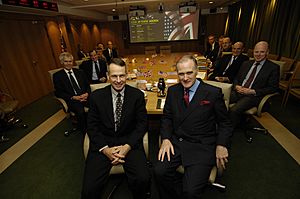
The strong military cooperation between the UK and US began in December 1941. They created the Combined Chiefs of Staff, a military command that oversaw all American and British operations during World War II. After the war, this joint command ended. However, close military cooperation continued in the early 1950s with the start of the Cold War.
Since World War II, the US has kept many forces in Britain. In July 1948, American B-29 bombers were first stationed there. Today, important bases include RAF Fylingdales, a radar facility that is part of the US Ballistic Missile Early Warning System. Other bases with a large US presence are RAF Menwith Hill, RAF Lakenheath, RAF Mildenhall, RAF Fairford, RAF Croughton, and RAF Welford.
After the Cold War ended, the number of US facilities in the UK was reduced. However, these bases have been used a lot to support military operations in the 1990s and early 2000s.
The two nations also work together at British military facilities like Diego Garcia in the British Indian Ocean Territory and Ascension Island. The US Navy sometimes uses British naval bases in Gibraltar and Bermuda. The US Air Force also uses RAF Akrotiri in Cyprus for reconnaissance flights.
Nuclear Weapons Development
The Quebec Agreement of 1943 allowed the two countries to develop atomic weapons together. Britain shared important documents and sent experts to help with the Manhattan Project. After the war, the US kept the results to itself for a while. But once the UK developed its own thermonuclear weapons, the US agreed to provide designs and materials for British nuclear weapons through the 1958 US–UK Mutual Defence Agreement.
The UK bought the Polaris system and then the US Trident system, which is still used today. The 1958 agreement also gave the UK access to the Nevada Test Site. From 1963, the UK conducted 21 underground tests there until 1991. The agreement was updated in 2004. The US and UK also did joint nuclear experiments in 2002 and 2006.
Military Equipment
The US offered Britain the chance to buy the F-117 Nighthawk stealth aircraft when it was still a secret project. The UK is the only main international partner in the largest US aircraft project ever, the F-35 Lightning II program. The UK helped design and choose the aircraft. Its biggest defense company, BAE Systems, works with the American company Lockheed Martin. BAE Systems is also the largest foreign supplier to the US Defense Department.
The US uses some British designs, like Chobham Armour and the Harrier GR9/AV-8B Harrier II aircraft. The UK also uses American designs, such as the Javelin anti-tank missile, M270 rocket artillery, the Apache gunship, and C-130 Hercules and C-17 Globemaster transport planes.
Other Areas of Cooperation
Intelligence Sharing
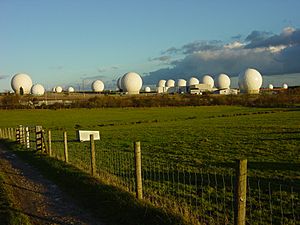
A key part of the Special Relationship is sharing intelligence. This started during Second World War with sharing code-breaking knowledge. After the war, the goal of watching and stopping communism led to the UK-USA Security Agreement of 1948. This agreement brought together the intelligence agencies of the US, UK, Canada, Australia, and New Zealand. It is still in place today and is known as the Five Eyes alliance. The head of the Central Intelligence Agency (CIA) in London attends weekly meetings of the British Joint Intelligence Committee.
One example of this cooperation is the UKUSA Community. This group includes America's National Security Agency, Britain's Government Communications Headquarters, and other agencies. They work together on ECHELON, a global intelligence gathering system. Under secret agreements, these countries do not spy on each other.
After a plot to bomb airplanes in 2006 was discovered, the CIA started helping the British Security Service (MI5). They worked together to track potential threats.
Economic Policy
The US is the biggest source of foreign direct investment in the UK. This means US companies invest a lot of money in the UK. Likewise, the UK is the biggest foreign investor in the US. British trade and money have always been important to the American economy. The "Special Relationship" in trade and finance is seen as "well-balanced." London's "light-touch" rules have attracted a lot of money from Wall Street.
Key products that Britain sells to America include aviation parts, aerospace equipment, chemicals, pharmaceuticals, and heavy machinery. British ideas, like Adam Smith's ideas on free trade and John Maynard Keynes's ideas on government spending, have also influenced American economic policy. Both countries' fashion and music industries also influence each other.
In 2007, US Ambassador Robert H. Tuttle suggested that the Special Relationship could be used to promote world trade, limit environmental damage, and fight terrorism. In 2013, US Secretary of State John Kerry said that almost one million people in the US work for British companies, and over one million people in Britain work for US companies. This shows how closely tied their economies are.
History of the Relationship
Before World War II, relations between the UK and US were often distant. President Woodrow Wilson and Prime Minister David Lloyd George met in Paris in 1919, but their relationship wasn't "special." Britain, which had been the stronger partner, found itself in a more secondary role starting in 1941.
The personal relationships between British prime ministers and US presidents have often shaped the Special Relationship. The close bond between Winston Churchill and Franklin Roosevelt was the first example. Churchill worked hard to build this relationship, which helped the war effort.
Two important people who helped build the Special Relationship were Field Marshal Sir John Dill and General George Marshall. Their good personal relations and high positions helped strengthen the alliance. Major links, like the Combined Chiefs of Staff, were created during the war.
The diplomatic policy behind the Special Relationship had two parts: strong personal support between leaders and military and political help. The warmest personal relationships between leaders were always based on shared goals. High points include the bonds between Harold Macmillan and John F. Kennedy, James Callaghan and Jimmy Carter, Margaret Thatcher and Ronald Reagan, and more recently, Tony Blair with both Bill Clinton and George W. Bush.
Low points happened due to disagreements on foreign policy. Examples include Dwight D. Eisenhower's opposition to UK actions in Suez under Anthony Eden, and Harold Wilson's refusal to join the war in Vietnam.
Churchill and Roosevelt (1940–1945)
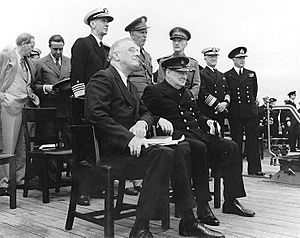
When Winston Churchill became Prime Minister, the UK was already in World War II. President Roosevelt had been secretly talking with Churchill since September 1939. They discussed how the US could help Britain in the war. Roosevelt believed the US would eventually join the war. To win a third term as president, he promised Americans he would keep them out of the war.
In December 1940, Roosevelt gave his Arsenal of Democracy Speech. He said it was important for the US to help Britain to prevent the conflict from reaching American shores. He wanted to show that helping Britain was good for US national security.
To help Britain, Roosevelt started the Lend-Lease policy. He also worked with Churchill to write the Atlantic Charter. The US finally joined the war in December 1941. Roosevelt and Churchill liked each other. They shared interests in tobacco, liquors, history, and battleships. Churchill later wrote that he felt he was with "a very great man, who was also a warm-hearted friend."
One story shows their close bond. When Churchill was staying at the White House, Roosevelt visited his room while Churchill had just come out of the bath. Churchill joked, "You see, Mr. President, I have nothing to hide from you." Roosevelt found it funny. Between 1939 and 1945, they exchanged about 1,700 letters and telegrams and met 11 times. They worked closely to create the IMF, World Bank, and NATO.
Churchill and Truman (1945)
Roosevelt died in April 1945 and was replaced by his vice president, Harry Truman. Churchill and Truman also became good friends. Churchill supported Truman, calling him "the type of leader the world needs." At the Potsdam Conference, Truman, Churchill, and Joseph Stalin made agreements about Europe's borders.
Attlee and Truman (1945–1951)
In July 1945, Churchill's party lost the election, and Clement Attlee became Prime Minister. Attlee had met Truman right after Roosevelt's death. They liked each other, but they didn't become very close. They only met three times and didn't write to each other often. However, their working relationship remained strong.
Attlee took Churchill's place at the Potsdam Conference. In 1950, Attlee flew to Washington to support Truman against Douglas MacArthur. Truman also pressured Attlee not to interfere in Iran in 1951. Attlee also convinced Truman to agree to more nuclear cooperation.
Thatcher and Reagan (1981–1989)
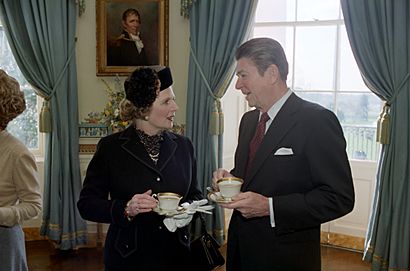
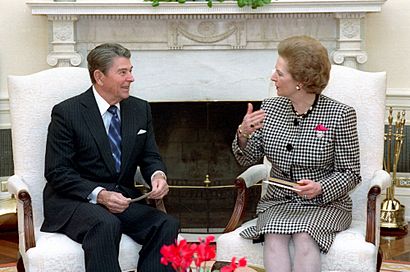
The friendship between President Ronald Reagan and Prime Minister Margaret Thatcher was very strong. They were called "ideological soul-mates." They both believed in free markets, low taxes, limited government, and a strong military. They were determined to win the Cold War against the Soviet Union. Thatcher told Reagan in 1981, "Your problems will be our problems and when you look for friends we shall be there."
In 1985, Thatcher said, "There is a union of mind and purpose between our peoples which is remarkable... It is special. It just is, and that's that." Reagan agreed, saying their friendship was "very special."
In 1982, Thatcher and Reagan agreed to replace Britain's Polaris nuclear fleet with US-supplied Trident missiles. Reagan's support during the Falklands War was a bit late, but US Defense Secretary Caspar Weinberger provided strong help with intelligence and weapons. It was later revealed that Reagan had a secret plan to lend a US aircraft carrier to the British if one of their carriers was sunk.

In 1986, Washington asked to use British airbases to bomb Libya. This was in response to a terrorist bombing in Berlin. The British cabinet was against it, and Thatcher worried about attacks on British interests. However, Libyan terrorism then decreased. Britain also received praise in the US because Spain and France had refused to let American planes fly over their countries.
A more serious disagreement happened in 1983 when Washington did not consult London about the invasion of Grenada. Grenada is part of the Commonwealth of Nations. Thatcher was a close ally of Reagan, but she personally opposed the invasion. Reagan told her it might happen just three hours before it started. She publicly supported the US action later. Reagan called to apologize for the lack of communication, and their friendship continued.
Historian Peter Hennessy noted that the personal relationship between "Ron" and "Margaret" was very successful. He said it was almost as warm and important as the one between Roosevelt and Churchill.
Johnson and Biden (2021–2022)
After Donald Trump lost the 2020 US presidential election, Boris Johnson congratulated Joe Biden. Johnson said he looked forward to working with Biden on shared goals like climate change and trade. He also said the US was the UK's most important ally.
Biden became president on January 20, 2021. Johnson was reportedly the first European leader Biden called after becoming president. Biden's team said he wanted to work closely with Johnson, especially on the 2021 G7 Summit and the 2021 United Nations Climate Change Conference.
Biden's first trip overseas and first meeting with Johnson was at the 2021 G7 Summit in Cornwall, England. Johnson called Biden a "breath of fresh air." They planned to restart travel between the US and UK and agreed on a new Atlantic Charter. This charter commits them to working on challenges like cyber security, new technologies, global health, and climate change. President Biden clearly "affirmed the special relationship." They also promised to uphold the Good Friday Agreement, which is important to Biden. Both leaders said their meeting confirmed the "special relationship."
Public Opinion
It's been noted that secret defense and intelligence links, which don't affect most people, play a big role in the transatlantic friendship. Also, people in the UK and US have different views on the Special Relationship.
Poll Results
A 1942 poll in Britain showed that the Soviet Union was more popular than the US as a wartime ally. However, few Britons had visited the US or knew Americans personally.
In 1969, the US was seen as equally important as the Commonwealth of Nations for Britain's overseas connections. Europe was a distant third. By 1984, after joining the European Economic Community, Britons saw Europe as most important.
Cold War polls showed mixed feelings in Britain towards the US. Only 36% of Britons approved of Thatcher's 1979 agreement to base US cruise missiles in Britain. By 1984, 74% had little trust in the US to handle world affairs wisely. Still, 70% of Britons found Americans trustworthy. In case of war, Americans were overwhelmingly trusted to help Britain. Both countries were also seen as similar in basic values like fighting for their country and the importance of freedom.
In 1986, after Reagan bombed Libya, 71% of Britons disagreed with Thatcher's decision to allow the use of RAF bases. Two-thirds opposed the bombing itself.
The lowest poll rating for Britain in the US was in 1994, during disagreements over the Bosnian War. Only 56% of Americans saw Britons as close allies.
In a 1997 poll, 63% of Americans saw Britain as a close ally. Canada ranked first (73%) and Australia third (48%). However, many Britons didn't know much about the historical link. In a 1997 poll, 53% wrongly thought the US had never been a British possession.
In 1998, 61% of Britons felt they had more in common with US citizens than with the rest of Europe. A majority also supported Blair's approach to Iraq.
A 2006 poll showed that Britain was viewed more positively than any other country by Americans as an 'ally in the war on terror.' Another poll found 74% of Americans saw Britain as a 'close ally in the war in Iraq.'
However, a June 2006 poll in the UK showed that only 58% of Britons thought a close relationship with the US was important for Britain's long-term security. Also, 65% believed Britain's future was more with Europe than America. Only 44% thought America was a "force for good in the world."
In January 2010, a US poll found that 57% of Americans thought the special relationship with Britain was the world's most important partnership. In May 2010, a UK poll showed 66% had a favorable view of the US, and 62% agreed America was Britain's most important ally. But 85% felt the UK had little influence on US policies.
A 2021 poll showed that 31% of American respondents picked Britain as their closest foreign policy partner. This made it the most chosen country.
Iraq War
After the 2003 invasion of Iraq, some British officials criticized the US government. They felt the US didn't listen to British advice on how to manage Iraq after the war. This included concerns about the de-Ba'athification policy and the importance of preventing a power vacuum that led to conflict.
Extraordinary Rendition
The US had told the UK that 'extraordinary rendition' flights (where people are secretly moved to other countries for questioning) had never landed on British territory. However, official US records later showed that such flights had landed at Diego Garcia many times. This was embarrassing for British Foreign Secretary David Miliband, who apologized to Parliament.
Trade Policy
Trade disagreements and job worries have sometimes strained the Special Relationship. The US has been accused of using or ignoring World Trade Organization rules to push its own trade policies. This caused problems for the UK, especially with challenges to banana farmers in the West Indies and high tariffs on British steel. In 2002, Blair called Bush's steel tariffs "unacceptable."
See also
- ABCANZ Armies (Five Eyes)
- Atlanticism
- Foreign policy of the United States
- Foreign relations of the United Kingdom
- Great Rapprochement
- Pilgrims Society
- Special relationship (international relations)
- The Technical Cooperation Program (TTCP)
 | Leon Lynch |
 | Milton P. Webster |
 | Ferdinand Smith |


